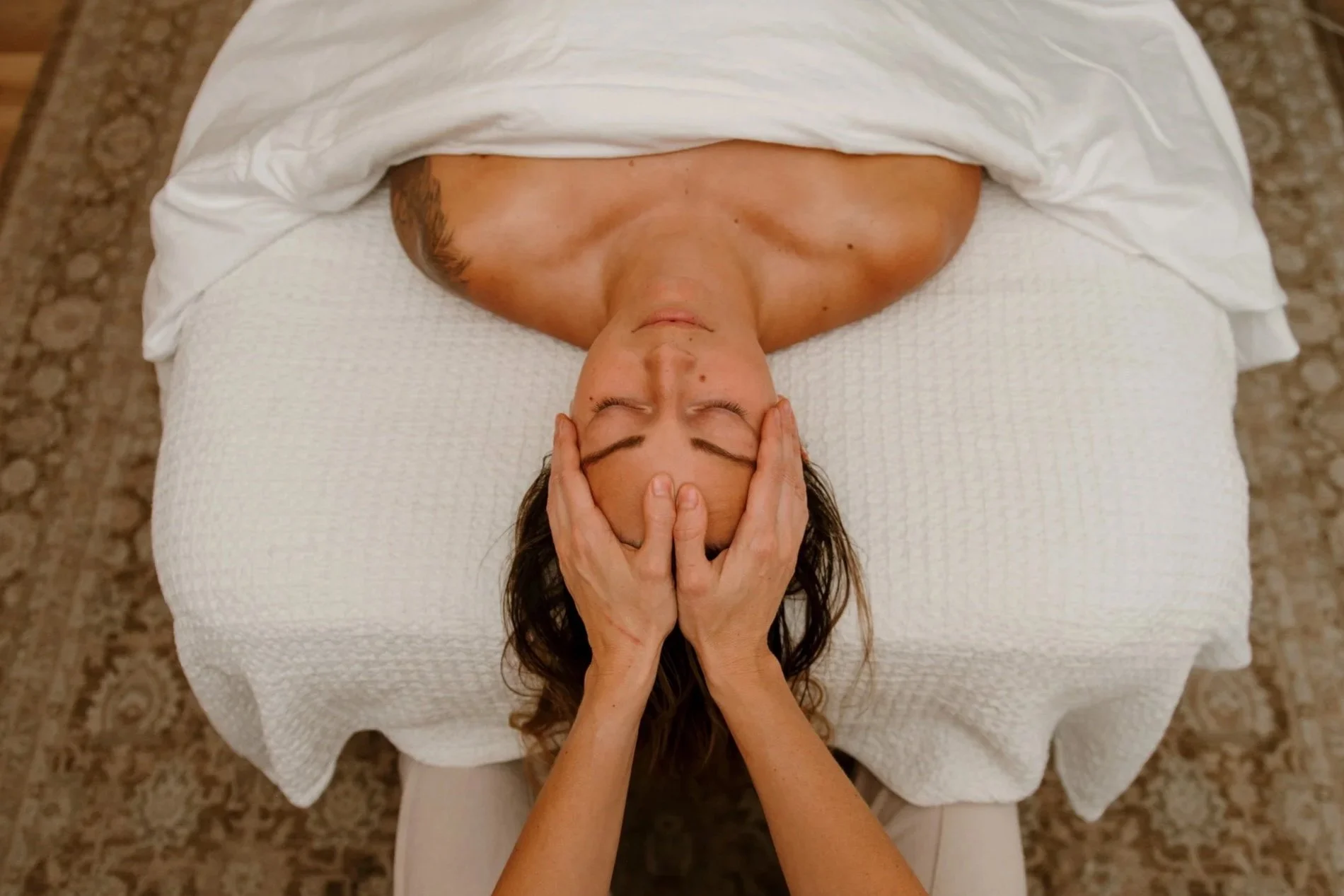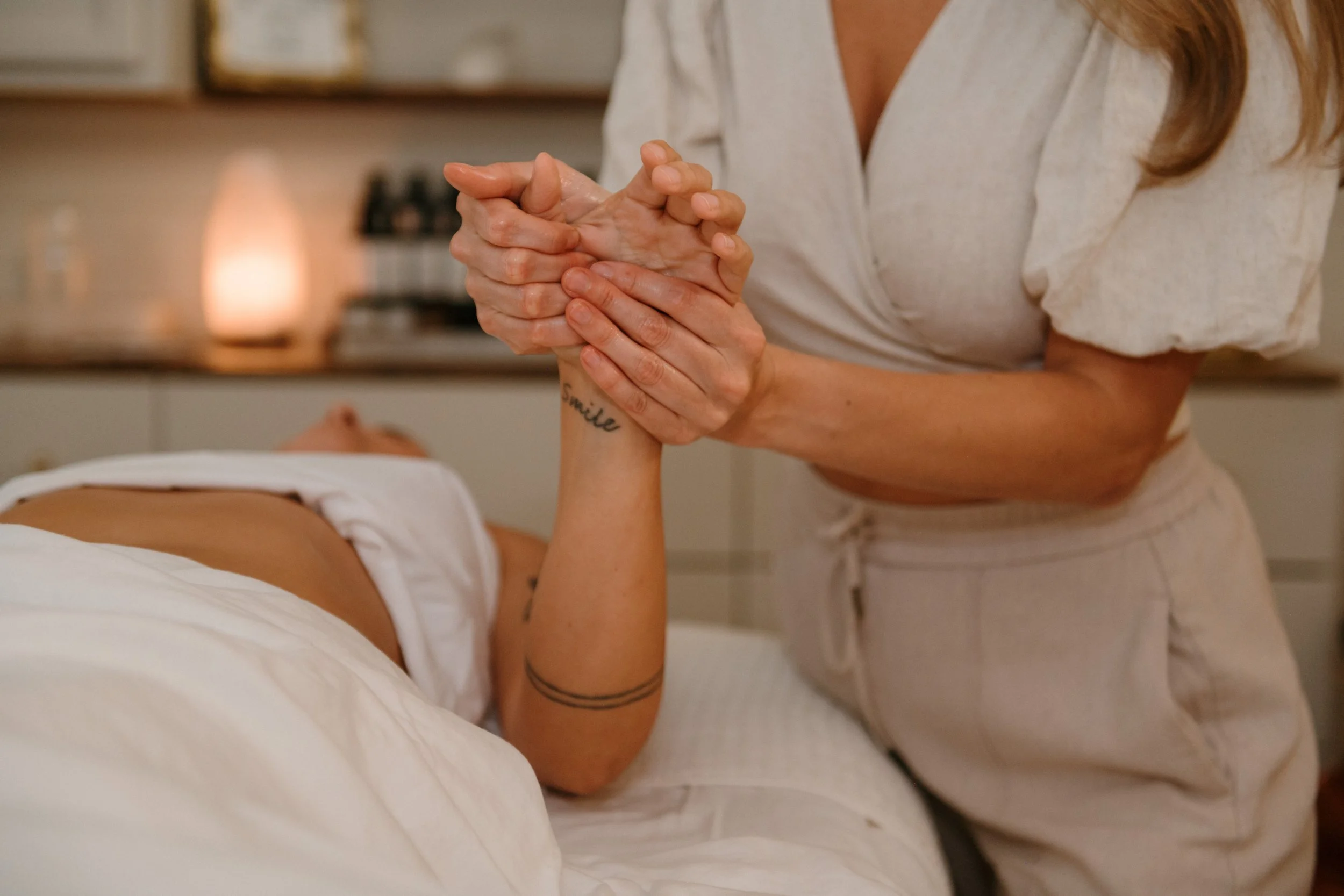MASSAGE THERAPY
Wholistic Massage focuses on the health of the mind, body, and spirit. Each session awakens conscious awareness into the body’s subconscious patterns of disharmony, which often are the root cause of tension, pain, and discomfort. With a focus on connective tissue health, energetic vitality, and nervous system integration, wholistic massage is a valuable addition to wellness routines that wish to incorporate states of relaxation and affective therapeutic touch.
Our evidence-based massage therapy and bodywork offerings are curated to help your body both heal and prepare for the demands of life—whether you are seeking massage for relaxation or targeted treatments for overall well-being; we can help you on your wellness journey.
Massage therapy is a whole-body treatment that has the potential to positively affect many physiologic processes, contributing to its ability to support the healing of a vast array of conditions.
CONDITIONS WE ADDRESS
-
The American College of Physicians recommends massage as an early option for acute and subacute low-back pain. This is supported by evidence in favor of massage alone or massage plus exercise for back pain. Craniosacral therapy has also been seen to be helpful for chronic, uncomplicated low-back pain. And a systematic review of nonpharmacologic therapies for low-back pain recommends massage among other interventions.
Similarly, manual therapy has robust evidence for clients with neck pain in a variety of settings, so it is often included in clinical practice guidelines managing neck pain.
-
Headaches, especially tension-type headaches and those related to neck pain and trigger points, appear to respond well to massage therapy. Researchers found that patients experienced lower levels of pain and reduced frequency. All these findings support a systematic review that found massage can be as effective as pharmacological interventions for tension-type headaches. Massage therapy is so consistently helpful that it is recommended in clinical guidelines for headache care.
-
Research supports massage therapy for fibromyalgia, specifically for pain, anxiety, quality of life, and sleep. The best results were seen with long-term treatments, so this suggests that people with fibromyalgia commit to several weeks of regular massage to derive the most benefit.
-
Massage by itself or in combination with aromatherapy, can be an effective strategy to help manage symptoms and improve function in people who have arthritis. Some studies looked at whole-body relaxation treatments, while others examined bodywork, including self-massage, targeted to the affected area.
-
Massage therapy has a surprisingly robust body of evidence showing benefits for people with depression, anxiety, posttraumatic stress disorder (PTSD), and other mood-related challenges. Much of this research has been done in settings where depression, anxiety, and stress are part of a larger health picture (such as among hospital patients, or in the context of chronic pain), although one study looked at the effects of massage therapy on 70 women diagnosed with anxiety and depression who underwent a month of spa treatments; not surprisingly, their stress-related hormones and other biochemical changes suggested that massage can be helpful in this circumstance.
-
Sprains (torn ligaments) often respond well to massage therapy along with some movement therapy. Research has shown that stimulating nerves in the area of sprains can improve balance and stability, especially around the ankle.
-
A systematic review combining findings from dozens of studies found that massage therapy was helpful for CTS symptoms. This supports similar conclusions of studies that found patients with CTS who received massage had significant decreases in symptom severity and improvements in strength and function of their hands and wrists—especially in comparison with other interventions.
-
Many physicians recommend massage therapy, especially to the muscles of the lower leg, as part of treatment for plantar fasciitis. However, relatively little research has been done on this topic. One study compared massage and exercise to ultrasound and exercise, and found that massage led to longer-lasting relief for the participants, and a small systematic review found support for soft tissue mobilization to help patients with plantar fasciitis.
-
Much of the research about massage therapy as a way to manage sleep quality and insomnia has been done in the context of other conditions. For instance, one study found that massage helped reduce insomnia symptoms for women who are postmenopausal. A systematic review concluded that massage could improve sleep quality for women who are pregnant. Several studies find that massage helps people to sleep better while they deal with complex medical conditions such as breast cancer; congestive heart failure; or chronic health conditions in children.
-
Autoimmune diseases, including lupus, multiple sclerosis, rheumatoid arthritis, and scleroderma, present challenges that massage therapy can address. Pain, fatigue, quality of life, mood, and self-efficacy (the belief that one can succeed and thrive in spite of obstacles) are all positively affected by massage for people who live with autoimmune diseases.
Sources:
Mooventhan, A., & Nivethitha, L. (2014). Effects of acupuncture and massage on pain, quality of sleep and health related quality of life in patient with systemic lupus erythematosus. Journal of Ayurveda and Integrative Medicine, 5(3), 186–189. https://doi.org/10.4103/0975-9476.140484
Backus, D., Manella, C., Bender, A., & Sweatman, M. (2016). Impact of Massage Therapy on Fatigue, Pain, and Spasticity in People with Multiple Sclerosis: a Pilot Study. International Journal of Therapeutic Massage & Bodywork, 9(4), 4–13. https://doi.org/10.3822/ijtmb.v9i4.327
Field, T., Diego, M., Delgado, J., Garcia, D., & Funk, C. G. (2013). Rheumatoid arthritis in upper limbs benefits from moderate pressure massage therapy. Complementary Therapies in Clinical Practice, 19(2), 101–103. https://doi.org/10.1016/j.ctcp.2012.12.001
-
Painful menstruation, also called dysmenorrhea, is a leading reason for missed school and work. It has been the subject of substantial research, because massage therapy is a noninvasive, nonpharmaceutical, and low-risk option for women who struggle with painful cramps. One study found that connective tissue manipulation (a specialized type of bodywork on the back) was effective for menstrual pain. Another study compared this technique to foot reflexology; both interventions were equally helpful for symptoms, and benefits lasted at least through the following menstrual cycle. A meta-analysis that combined data from several studies concluded that abdominal aromatherapy massage was helpful for pain relief among women with menstrual cramps.
Source:
ÖZGÜL, S., Nalan ÇİNAR, G., GÜRŞEN, C., BARAN, E., ÜZELPASACI, E., NAKİP, G., Nur Gerlegiz, E., ÇELENAY, Ş. T., & AKBAYRAK, T. (2023). The Effects of Connective Tissue Manipulation in Primary Dysmenorrhea: a Randomized Placebo-Controlled Study. Reproductive Sciences (Thousand Oaks, Calif.), 30(1), 181–191. https://doi.org/10.1007/s43032-022-00964-5
Toprak Celenay, S., Barut, O., Karakus, A., & Alkan, A. (2023). Comparison of Connective Tissue Massage and Classic Massage in Women With Primary Dysmenorrhea: A Randomized Clinical Trial. Journal of Manipulative and Physiological Therapeutics, 46(5), 305–314. https://doi.org/10.1016/j.jmpt.2024.09.005
Sut, N., & Kahyaoglu-Sut, H. (2017). Effect of aromatherapy massage on pain in primary dysmenorrhea: A meta-analysis. Complementary Therapies in Clinical Practice, 27(NA), 5–10. https://doi.org/10.1016/j.ctcp.2017.01.001
Najaf Najafi, M., Najaf Najafi, N., Rashidi Fakari, F., Moeindarbary, S., Abdi, F., Sadat Hoseini, Z., & Ghazanfarpour, M. (2021). The Effect of Aromatherapy Alone or in Combination with Massage on Dysmenorrhea: A Systematic Review and Meta-analysis. Revista Brasileira de Ginecologia e Obstetrícia, 43(12), 968–979. https://doi.org/10.1055/s-0041-1740210

MASSAGE & BODYWORK OFFERINGS
WHOLISTIC MASSAGE
An integrative and wholistic personalized therapeutic massage that weaves together relaxation massage, deep tissue modalities, myofascial release, and craniosacral therapy. Book this treatment to reap the body wide benefits of massage therapy for whole being wellness.
BUCCAL & TMJ MASSAGE
Buccal inteoral massage rejuvenates the face naturally by releasing adhered connective tissue that produces fine lines and wrinkles—while stimulating micro-circulation and lymphatic flow. This treatment helps manage symptoms of TMJ and tense muscles due to bruxism. Contraindicated for recent Botox, fillers, collagen treatments, and surgery. Treatment includes buccal massage with skin specific lotion/oil; no mask/extractions.
Gretchen is so skilled at her craft. She is easily one of the most knowledgeable practitioners I’ve ever had the pleasure of receiving treatments from. She is always learning and adding to her skills. I feel so comfortable around her and leave feeling incredible. I’d give her 10 stars if we could!
- Nicole Garrity of Abode Team
Gretchen is warm & inviting. I feel safe and seen when I am with her. Her knowledge of our bodies & what we need beyond the physical makes me continue to rebook and rebook. she is a fantastic massage therapist/bodyworker I can’t get enough of her!!!! She is kind & patient and never makes me feel rushed even though I know she has places to go and people to see!
- Caitlin Ferrante of Rose Drop
Gretchen gave an amazing massage and body work session, my back and right shoulder feel better than they have in months. She is a skilled practitioner with a calming and soothing approach. Thank you Gretchen!!
- Jill of Lymph & Bodywork



